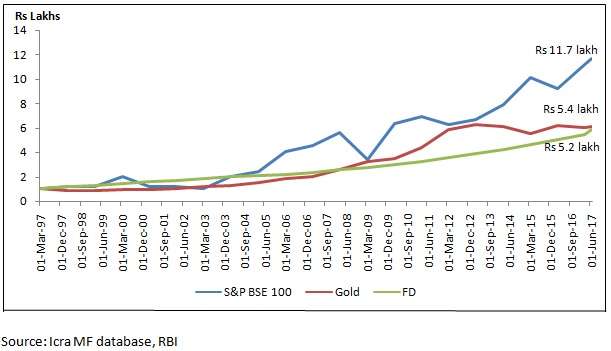
We have always maintained that if an investor has to generate inflation beating returns that aids in creating wealth over long term, one has to stay invested in equities through the ups and downs of the market. And this study that we have done establishes just that. We have compared the returns generated by three of the major investment avenues investors consider for investing(apart from real estate) namely equity, gold and FD.
We can see that equity(represented by the more broader BSE 100 index) is by far the best performer in the last 20 years delivering more than twice the amount of money invested in FD and gold.
Rs 1 lakh invested in 1997 in equity would have become Rs 11 lakhs in 2017 while the same investment would have just been Rs 5.4 lakhs and Rs 5.2 lakhs in gold and FD respectively( post tax returns in gold and FD taxed at 20% with indexation, while long-term capital gains tax in equity is nil).
This translates to the overall money multiplying by 11 times in equity compared to 5.4 times in gold and 5.2 times in FD
But yes, the equity returns did not come by without volatility. Equity markets have, in the last 20 years, gone through the crash of 2002 dot com bubble and the subprime crisis of 2008. Having said that, it is at the back of such crashes that investors tend to really get a chance to build wealth. In the aftermath of the dotcom crash, the markets returned 98% between 31 Mar 2003 and 2004 and since then the markets rallied 576%. Similarly post the 2008 crash, between March 2009 and 2010 the markets moved up by 98% , delivering 246% till date.
All this reiterates that the patient investors who have stayed put have been more than compensated for the volatility by means of higher returns.
Compare this with the other asset classes. You will see that while your deposits may provide some stable income, they are not avenues to build wealth. Gold, has not only been volatile but also delivering poorly, losing much of what it gained once its up-cycle was done. Remember, gold does not have an intrinsic fundamental value and derives it from other external factors. It is therefore hard to know when and whether its cycle will see a turn.
Long-term stability
Equity may see short-term volatility but remains a highly dependable asset class in the long term. When we look at the rolling returns of equity since 1997, the lowest seven year returns has been only 2%, and that too for just freak period. This would not have hurt you had your investments been running on SIPs. There has not been an instance that anyone would have lost money had they stayed invested for any seven year period in these 20 years.
On a fiscal year basis, equities have delivered negative returns on 33% of the occasion compared with 24% by gold and 0% by FD. At the same time it can be said that the returns delivered during the rest 66% of the occasion far out weights the returns delivered by gold and equities.
Since you will never know whether you will fall in this 33% bucket (with negative returns) the best you can do is to invest in equities systematically using SIPs or STPs and reduce the risk of volatility.
Investing in equities requires a lot of patience and persistence and it is these investors who tend to reap the rewards in the end. Have a long term horizon and when in doubt get in touch with your advisor who will help you in clarifying any doubts.









It would have been even more clearer if the annualized rate of return were given for each category. Its also not clear if by “equities” you refer to direct purchase of shares or thru mutual funds. I assume it a pure play on shares, which means mutual funds probably would be somewhere between gold and equity. If this report were extended to 30 years, I believe gold would have underperformed FD’s
It would have been even more clearer if the annualized rate of return were given for each category. Its also not clear if by “equities” you refer to direct purchase of shares or thru mutual funds. I assume it a pure play on shares, which means mutual funds probably would be somewhere between gold and equity. If this report were extended to 30 years, I believe gold would have underperformed FD’s
Equities can be great investments over the long term. Despite the recession, war, natural disasters, corporate scandal and other financial crises, stocks have historically offered higher long-term growth potential than other types of investments.
Indian Market is best for long term investment.
Indian Market is best for long term investment.
Equities can be great investments over the long term. Despite the recession, war, natural disasters, corporate scandal and other financial crises, stocks have historically offered higher long-term growth potential than other types of investments.